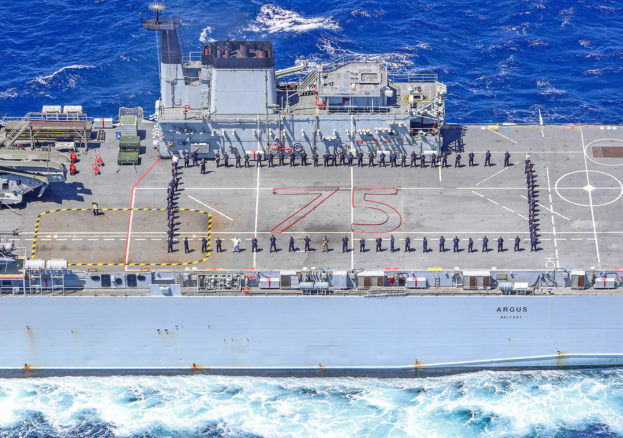
From the immortal White Cliffs of Dover to the sands of Bahrain and Caribbean and windswept Falklands, the men and women of the Naval Service will join their countryfolk in paying homage to our greatest generation and remember the sacrifices made between 1939 and 1945.
The Royal Navy lost more than 250 warships defeating Nazi Germany and Fascist Italy; more than 40,000 sailors and Royal Marines were killed in the Atlantic, Arctic and Mediterranean.
The coronavirus pandemic has forced the cancellation of many large-scale events marking the 75th anniversary of Victory in Europe Day – which is a national holiday – including a parade in London involving veterans.
Nevertheless, every effort is being made to ensure May 8 2020 is a day to remember reflecting both the celebration and sacrifice befitting the greatest day in the history of our isles in the 20th Century.
Among those pausing to reflect will be Warrant Officer 2nd Class Jules Cook, Bandmaster of The Band of Her Majesty’s Royal Marines CTCRM, based at Lympstone in Devon.
“My granddad Eric Cook sadly passed away last year at the age of 99,” he said.
“He served in Africa as a gunlayer in the Royal Artillery and if I could speak to him now I’d say to him: ‘I’m still really proud of you, granddad. Miss you loads and I cannot wait to tell you some more stories one day.’”
Sailors, soldiers and Royal Marines aboard support ship RFA Argus patrolling the Caribbean to provide assistance in the event of a hurricane, have already paid their respects by spelling out 75 on the flight deck.
Events on Friday begin at 8am with all Government buildings flying the Union Flag at full mast – something they will do on all three days of the Bank Holiday weekend (lowering the standard at 8pm).
River-class patrol ship HMS Severn will patrol the White Cliffs of Dover to coincide with a Spitfire flypast and a lone piper on the clifftop.
There will be a nationwide two minutes’ silence at 11am to remember more than 400,000 British military personnel and civilians who died in World War 2.
At 3pm, Royal Navy warships and support vessels of the Royal Fleet Auxiliary at home and deployed around the world will blast their sirens for a minute to celebrate victory – the time marks the moment on Tuesday May 8 1945 when Prime Minister Sir Winston Churchill addressed the nation.
The Band of Her Majesty’s Royal Marines have produced special versions of We’ll Meet Again and A Nightingale Sang in Berkeley Square, while the Corps of Drums will perform a special event on Horse Guards Parade, all while operating under Government rules.
Finally at 9.30pm, searchlights on naval ships – both those in harbour and those at sea – will be directed skywards for five minutes; the war’s end marked the lifting of the blackout after nearly six years.
As she is exercising with the Americans in the Barents Sea – off the North Cape – it will be too light for HMS Kent’s searchlights. Instead, the frigate is flying a large battle ensign, a particularly large White Ensign traditionally used in actions to identify a ship’s nationality amid the smoke and fire of battle.
The ship will also hold a service of thanksgiving for those who gave their lives in these waters on the brutal Arctic convoys between 1941 and 1945.
Find out more about the Naval Service’s tributes to the men and women of 1939-1945 – shinealight
